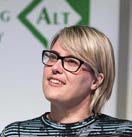

Dr Maren Deepwell
Chief Executive Officer, Association for Learning Technology, UK
This global pandemic has changed the learning technology landscape across sectors here in the UK and across the globe. Never before have learners of all ages engaged with learning, teaching and assessment using digital technologies at this scale. Never before has the role of learning technologists been as important — or as challenging — as it has been since 2020. Scaling up technology use at this rapid pace prompted knowledge sharing and community support, as individuals and institutions shared resources and expertise freely, and thousands of professionals took part in CPD and training activities online.
Recent findings from ALT’s Annual Survey 20201 paint a picture of learning technologists at the helm of moving over 90% of provision to online and blended formats. The survey further indicates that 65% of learning technologists are working on revising institutional policies.
This shift continues to put learning technologists here in the UK and elsewhere under pressure, placing them centre stage in the role of supporting, training and guiding staff and students.
In this context, finding ethical approaches to using digital technologies at scale is at the heart of long-term strategies for online and blended learning.
Whilst there are wider concerns about the impact of the pandemic on access to and participation in education, ALT’s Annual Survey 2020 shows that learner engagement continues to be the number one driver for the use of learning technology — a trend that has remained constant for the past five years.
Learning technology has played a very important and positive role in enabling learning to continue during a global crisis, but at the same time, the increase in the use of digital education tools has forced many institutions to address concerns from students regarding tools such as proctoring software, and surveillance-like techniques used to track learning and engagement. Alongside students’ concerns, staff have highlighted the importance of the governance and implementation of technology used in education.
The survey also helped identify a gap between institutional ethical policies and efforts developers and providers are making — a lack of an overarching ethical framework that can be used by individuals, institutions and providers. In the UK, we have seen an increase in senior and leadership roles in learning technology, with 20% of survey respondents indicating that leadership is now the main focus of their role — and this opens up an opportunity for institutional and national policies for learning technology.
Building on the established professional accreditation framework for learning technology, CMALT, which was expanded in 2019 to include ethical considerations for professional practice and research, a working group has thus begun to work on establishing a dedicated ethical framework for professional practice in learning technology. The initial aim is to provide a starting point for informing the ethical use of learning technology for individuals, institutions and industry and to explore questions such as:
• What are the biggest issues emerging in ethical approaches to online and blended learning and teaching?
• In what contexts does the need for an ethical framework arise, and what are practical examples of these?
• What would the framework need to provide for individuals, institutions and industry?
The working group, which is active in higher education as well as other education and training sectors, has received input, including resources and a list of organisations that may help inform the framework, and it has worked to define a set of ethical principles that will form the core of the new framework. As well as these principles, tools need to be developed, such as case studies, example policies, and reflective questionnaires, to help individuals, institutions and industry see how these principles can be put into action. Central to the group’s work is this definition of learning technology2:
We define learning technology as the broad range of communication, information and related technologies that are used to support learning, teaching and assessment. We recognise the wider context of learning technology policy, theory and history as fundamental to its ethical, equitable and fair use.
If you are interested in the development of the framework, there are still opportunities to contribute and provide input to help shape it. The Working Group remains open for all to join. To find out more, please visit https://go.alt.ac.uk/EdTechEthics.
1 The Association for Learning Technology (ALT) supports a collaborative community for individuals and organisations from all sectors, including further and higher education and industry, and provides professional recognition and development. More information about the survey is available at: https://www.alt.ac.uk/about-alt/what-we-do/annual-survey


